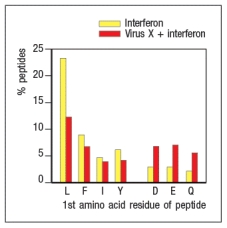Multiple Choice
Virus infections induce production of interferons that act on infected cells to enhance their recognition by CD8 cytotoxic T cells. To counter these mechanisms, viruses often encode proteins that interfere with antigen processing and presentation. In an experiment, cells infected with Virus X are treated with interferon and compared with uninfected cells treated with interferon. Proteasomes are isolated from the two cell populations and their enzymatic activities are compared. The data in Figure show the amino acid preferences for cleavage of peptides by the two samples of proteasomes. 
Based on these data, Virus X most likely encodes a protein that interferes with:
A) The expression of MHC class I on the surface of the infected cell
B) The rate at which peptides are produced from intact proteins in the infected cell
C) The transport of peptides from the cytosol to the endoplasmic reticulum in the infected cell
D) The replacement of constitutive proteasome subunits with immunoproteasome subunits in the infected cell
E) The development of CD8 T cells in the thymus by inhibiting the thymoproteasome
Correct Answer:

Verified
Correct Answer:
Verified
Q1: The invariant chain protein, Ii, has only
Q2: NKT cells that recognize microbial glycolipids bound
Q3: During MHC class I synthesis and folding
Q4: The experiment shown in Figure uses two
Q6: T cells expressing <span class="ql-formula"
Q7: Empty MHC class I and MHC class
Q8: The adaptive immune system developed a strategy
Q9: In a mixed lymphocyte reaction, T cells
Q10: MHC class I surface expression is dependent
Q11: A cell line carrying a mutation in